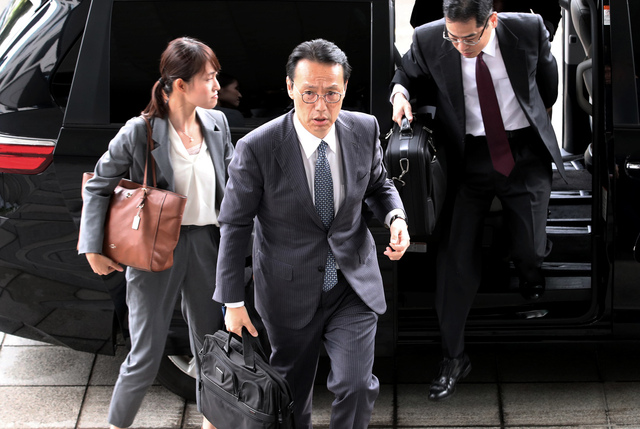 |
|
Kenji Kanasugi, director-general of Asian and Oceanian Affairs at Japan’s Ministry of Foreign Affairs, is entering the office of the South Korean Ministry of Foreign Affairs, in Seoul’s Jongno District, for bureau head-level talks on the afternoon of Aug. 29.
|
The day after Japan removed South Korea from its white list, director-generals from the two countries’ foreign ministries met in Seoul
Director-generals from South Korea and Japan’s foreign ministries held talks in Seoul on Aug. 29, just one day after Japan took the step of removing South Korea from its white list of countries that enjoy streamlined screening on the exports of strategic materials. Kim Jung-han, director-general for Asian and Pacific Affairs at the South Korean Ministry of Foreign Affairs, and Kenji Kanasugi, director-general of the Japanese Foreign Ministry‘s Asian and Oceanian Affairs Bureau, discussed the issue of forced labor during a meeting at the Seoul office of the South Korean Foreign Ministry on the afternoon of Aug. 29, the Foreign Ministry said. Kenji was on a trip to South Korea to attend the meeting. During his meeting with Kenji, Kim expressed strong regret for the Japanese government’s removal of South Korea from its white list the previous day and protested that measure, while once again calling for its swift retraction. Kim also stressed that, in order to resolve that issue, unconditional and sincere dialogue needs to be quickly held between officials from the two countries who are responsible for managing exports. Kim also said that Japan needs to constantly provide South Korea with concrete and accurate information about its alleged plan to dump water contaminated with radioactivity from its Fukushima nuclear plant into the ocean. An official from the South Korean Foreign Ministry said that the meeting, which lasted for about an hour and 10 minutes, “didn’t produce any meaningful progress because the gap between the two sides’ positions remains too wide.” Sources say that the two officials also discussed a range of possible solutions to the South Korean Supreme Court’s ruling about providing compensation for victims of forced labor during the Japanese colonial period. Here too, the two sides reportedly remained at loggerheads. Kim called for the two sides to find a solution through deliberations based on the “one plus one” proposal (in which South Korean and Japanese companies would voluntarily pay compensation to the victims) that the South Korean government make back in June, while Kenji repeated Japan’s demand that the South Korean Supreme Court’s ruling was a “violation of international law” and must therefore be amended. Kenji reportedly expressed Japan’s wish for South Korea to reconsider its decision to terminate its intelligence-sharing agreement with Japan (the General Security of Military Information Agreement, or GSOMIA), but Kim emphasized that Japan must withdraw its export controls before that can happen. By Park Min-hee, senior staff writer Please direct comments or questions to [english@hani.co.kr]






